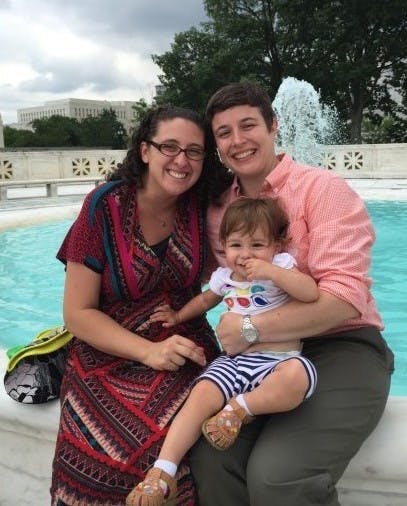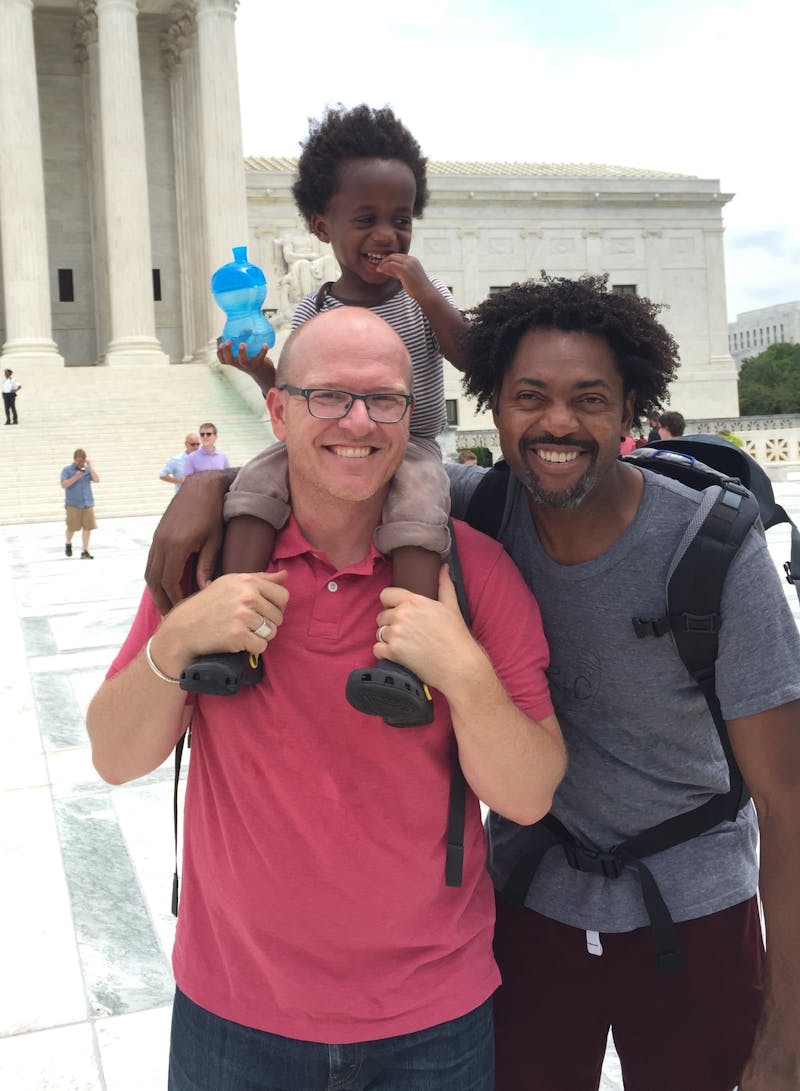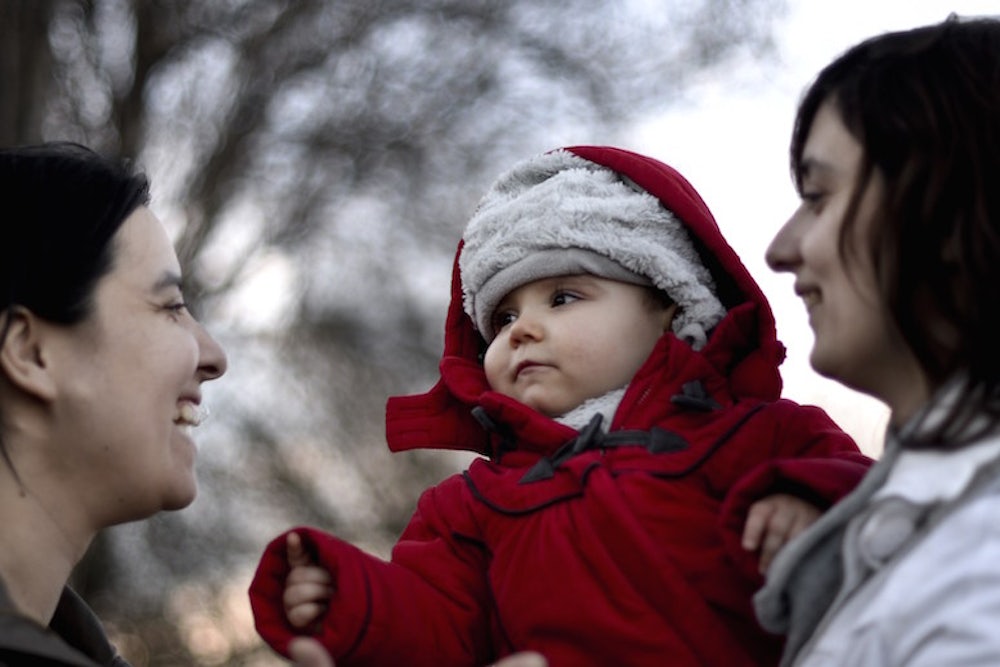Just days after Shawn Davis and Richard Sawyers were married in September 2011, they started planning to have kids. “You started asking fast,” Davis said recently, looking over at his husband. “Was it even on the honeymoon?”
“I think it was,” Sawyers replied, recalling their time in Venice following their wedding. We were sitting on the couch of their home in Washington, D.C.’s Brightwood neighborhood, near the border of Maryland, which they bought last year. Their two-year-old son, Levi, whom they adopted at birth, was napping upstairs.
The two had talked about parenthood for years before their honeymoon. They had even taken a workshop for LGBT couples that laid out the different paths to becoming same-sex parents: private adoption, public foster care adoption, surrogacy. But for Sawyers, the traditional order of operations still mattered. “It was important to be married and to be a family unit—I wanted that to happen first,” he said.
The same was true for the Wesoleks, another couple I met on the steps of the Supreme Court in June, on the day that gay marriage became legal nationwide. “Other people do it in different orders, but for us it was get married, buy a house, have a baby,” Danielle Wesolek told me. She and her wife, Amy Wesolek, moved to Takoma Park, Maryland, got two Boston Terriers, and then had their daughter, Lena, who’s now 18 months old.

The landmark ruling in Obergefell v. Hodges now paves the way for other same-sex couples to follow their lead. Most states permit only married couples or unmarried individuals to adopt, and some have laws that give married couples preference in the process. And if prospective parents want to hire a surrogate to carry their child, many states similarly require that they be hitched.
Prior to the Supreme Court’s decision, the path to parenthood for gay couples was significantly more complicated. In states that prohibited same-sex marriage, couples could pursue single-parent adoption. But that allowed only one parent to be recognized legally, and children could potentially be taken away from their families in the event of the illness, death, or separation of the one legal parent. Schools, hospitals, and other institutions could also deny non-legal parents the ability to make decisions about their children.
This shaky legal footing forced same-sex parents to seek various workarounds to protect their relationships with their children. They’ve drawn up co-parenting or custody agreements and other paperwork to build a case for their parental rights, even if they wouldn’t be legally guaranteed. In 15 states and Washington, D.C., individuals can petition for “second-parent” adoption of children conceived through assisted reproduction as well as adoption. The process can be costly and time-consuming—frequently involving lawyers, criminal background checks, and a home study by a social worker—which can feel particularly invasive for new mothers and fathers who already consider themselves to be the parents of their children.
Even in states that recognized same-sex marriage, couples have sought additional legal protection for when they travelled to states that didn’t recognize their union. When the Wesoleks went to South Carolina in May, for example, they made sure to pack the paperwork confirming Danielle’s parental status, just in case. “The thing that freaked me out was that this could be all down to one person—this could be down to one judge that said, ‘You know what, I’m going to take a stand,’” said Amy Wesolek, Lena’s birth mother, who conceived her through a sperm donor.
The Supreme Court’s decision has begun to alleviate some of these anxieties and lower the legal barriers to parenthood. Married same-sex couples are now allowed to adopt jointly in nearly every state, according to Emily Hecht-McGowan, director of public policy at Family Equality Council, an LGBT advocacy group. In the first ruling on the issue since Obergefell, a federal judge in Utah ordered that married lesbian couples who use sperm donors must be automatically recognized as legal mothers from birth, the same as with heterosexual parents.
Obergefell hasn’t cleared away all of the legal obstacles to same-sex parenthood. Michigan, Virginia, and North Dakota still allow child-welfare agencies to prohibit gay couples from adopting or fostering children for religious reasons. Mississippi prohibits same-sex adoption altogether. And despite the ruling in Utah, there’s still no guarantee in other states that couples who use sperm donors will be automatically recognized as parents. States that allow surrogacy often lack clear laws delineating parental rights, and courts have repeatedly granted those rights to surrogate mothers over the objections of same-sex parents. Louisiana outright prohibits same-sex couples from having a child through surrogacy.
But there will be growing pressure—and legal challenges—to dismantle such barriers as same-sex marriage and parenthood become increasingly mainstream. “One of the reason [same-sex] couples haven’t been adopting is because they didn’t have confidence in the system and the legality of it,” said April Dinwoodie of the Donaldson Adoption Institute, a research and policy group. The Supreme Court’s decision should give them more of that reassurance. Post-Obergefell, one of the country’s biggest surrogacy agencies is already reporting a spike in interest from newly engaged and married LGBT couples.
So will same-sex parents simply become the new beacons of old family values? In his Obergefell decision, Supreme Court Justice Anthony Kennedy drove home the notion that marriage is essential to parenthood and childrearing. “Without the recognition, stability, and predictability marriage offers, their children suffer the stigma of knowing their families are somehow lesser,” he wrote of same-sex couples.
Danielle Wesolek jokes that she feels like an “old man Republican” when she talks to her younger brother, who’s straight and had his first child around the same time as she did. “Don’t you think you ought to be married?” she tells him. In fact, that’s what pioneering gay conservatives had hoped for all along in their push for gay marriage. “The intent of same-sex marriage is not to establish new family structures but to reaffirm the old one,” writer Jonathan Rauch said in a 2004 talk at the University of Michigan.
But the rise of LGBT families could also affirm a more expansive and progressive notion of what it means to be a parent. As gay men and women come out earlier in life, fewer will have children from previous heterosexual relationships. As a matter of necessity, most gay parents have to use outside help—a donor, a surrogate, or adoption agency—to bring children into their lives. That’s affirmed a model of parenting built on relationships, support, and commitment, rather than biology or pre-determined gender roles. “We will have no choice but to see the law eventually evolve with us, and we are going to see an increased, expanding definition of who makes a family and what families looks like,” said Hecht-McGowan.

Those differences should be recognized and respected, not simply overlooked. Writer Andrew Solomon, who has a young son, recounted recently in the New Statesman how he and his husband are still asked “which of us is the mom,” comparing his experience to a single mother being asked what it’s liked to be “both Mom and Dad.”
“All men are created equal but not identical. New family structures are different from mainstream ones,” he wrote. “We are not lesser, but we are not the same, and to deny the nuance of that asymmetry is to keep us almost as ensnared as we were when our marriages and families were impossible.”
The ideal of a nuclear family is itself a historical artifact that rose to greatest prominence in the 1950s, when psychologists actually encouraged couples to abandon their friendships to focus on their families, explains marriage historian Stephanie Coontz, whose work Kennedy cited in his opinion. “In the long run, it harms your ability to call on a larger network of social support that you might need personally from the stresses of life, and that your family needs,” Coontz told me. “The problem with elevating [the nuclear family] as the source of all of your strength is that it almost by definition is too small to carry all of life’s burdens.”
Even as people like Justice Kennedy praise the virtues of marriage and a two-parent household, this traditional view of what constitutes a family is already a fiction. Only 40 percent of children now live with married heterosexual parents, and a record share of Americans have never married. “Legalizing same-sex marriage continues a trend towards more complex family relationships,” said sociologist Andrew Cherlin of Johns Hopkins University. “We’re becoming related to more and more people to whom we owe less and less.”
Gay parenting simply adds another layer of complexity to what’s already a very diverse and complicated picture. In his forthcoming book, Modern Families, sociologist Joshua Gamson explains the many ways that assisted reproductive technology and adoption have challenged traditional notions of kinship: A lesbian couple teamed up with a gay couple to adopt two children; a woman carried a child conceived from her partner’s egg and a sperm donor. He also tells his own story. His first daughter was conceived through eggs donated by one friend and carried by another. His second daughter was born through a privately hired surrogate.
Such arrangements mean that our notions of what constitutes a family will continue to expand and evolve. Already, open adoptions have increasingly popular for adoptive parents, gay and straight. When Levi’s birth mother discovered she was having a boy, she personally called Davis and Sawyers to tell them. They save every text message and email they receive from her to pass on one day to their son. On the bookshelf in Levi’s room is a photo of the three of them in the hospital. So far, his birth mother hasn’t taken up their invitation to see him, but they told her that they would always leave the door open. “It’s important for him to know where he comes from, to know who his people are, to know what that foundation is,” said Sawyers. “As a parent, I’m going to do everything I can to foster that relationship.”
With gay marriage now legal across the country, such complexity will become increasingly mainstream, making it harder to settle on a simple definition of what makes a family. “The challenges to the more conventional notions of kinship are going to come up more and more,” Gamson told me. “There’s just going to be more of us.”
